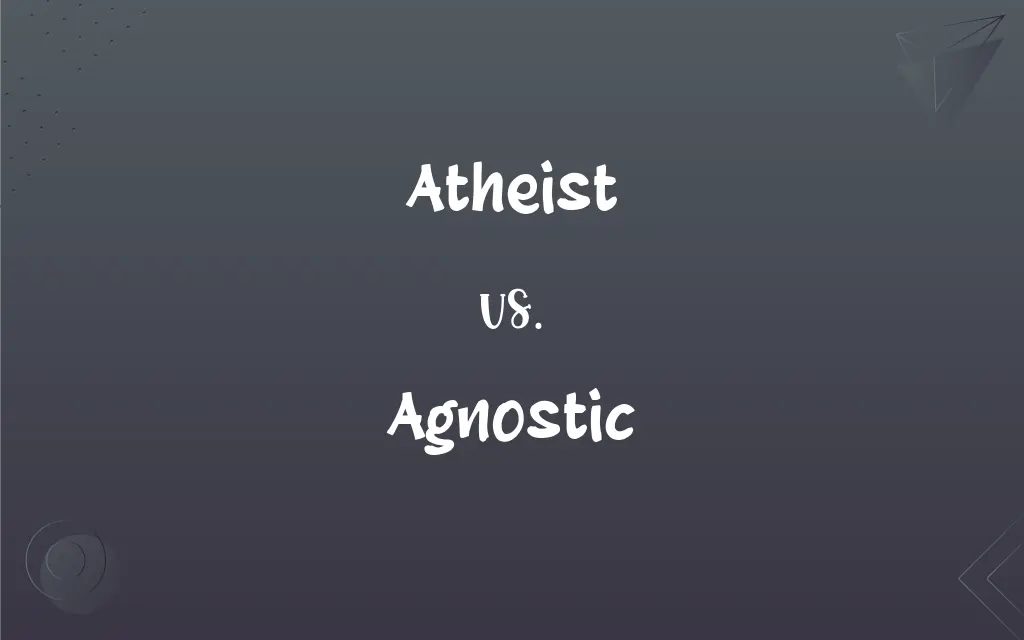Atheist vs. Agnostic: What's the Difference?
Edited by Aimie Carlson || By Harlon Moss || Updated on October 18, 2023
An atheist denies the existence of deities, while an agnostic claims neither belief nor disbelief, citing insufficient evidence.

Key Differences
Atheist and agnostic are terms often used to describe one's religious belief or, in these cases, perhaps a lack thereof. However, their meanings are distinct. An atheist straightforwardly rejects the belief in the existence of deities. This is not necessarily an active denial, but a lack of belief based on personal reasoning or lack of evidence.
Conversely, an agnostic occupies a middle ground. An agnostic neither believes nor disbelieves in the existence of a deity or deities. Instead, they assert that the truth about such matters is unknowable or that they personally lack the knowledge to make a decision. Essentially, agnosticism is about knowledge or the lack of it, while atheism is about belief.
While both atheists and agnostics might be skeptical of religious claims, their reasons differ. An atheist might reject religious teachings based on a lack of empirical evidence or personal experiences. On the other hand, an agnostic might feel there's insufficient evidence either way and remain undecided, often prioritizing evidence and logic in their considerations.
It's crucial to understand that these are not rigid categories but rather positions one might hold regarding belief and knowledge. Many individuals may identify with aspects of both viewpoints, sometimes describing themselves as "agnostic atheists" – those who don't believe in deities but also acknowledge they can't know for sure.
Comparison Chart
Basis
Belief
Knowledge
ADVERTISEMENT
Stance on Deities
Denies existence
Neither confirms nor denies existence
Certainty
Typically more certain
Typically uncertain
Reasoning
Lack of evidence or personal conviction
Insufficient evidence to decide
Overlap
Can be purely atheistic
Can also be "agnostic atheist"
Atheist and Agnostic Definitions
Atheist
Someone lacking belief in gods.
As an atheist, Mark doesn't partake in religious ceremonies.
ADVERTISEMENT
Agnostic
A person undecided about religious belief due to lack of evidence.
Tom identifies as an agnostic, often questioning religious teachings.
Atheist
One who believes there's no divine being.
As an atheist, he found solace in nature.
Agnostic
One who neither believes nor disbelieves in deities.
Being agnostic, Mike doesn't lean strongly either way.
Atheist
An individual without a theistic belief.
The atheist group met for a discussion at the park.
Agnostic
Someone who believes the truth about deities is unknowable.
Lisa, an agnostic, says she's open to evidence.
Atheist
A person who denies the existence of deities.
Jane, an atheist, doesn't attend church.
Agnostic
Someone prioritizing evidence and logic in matters of faith.
As an agnostic, she often found herself in deep philosophical discussions.
Atheist
A person who rejects religious belief.
Being an atheist, Sarah often debates religious topics.
Agnostic
An individual uncertain about religious claims.
The agnostic speaker shared his journey of seeking evidence.
Atheist
Disbelief in or denial of the existence of God or gods.
Agnostic
One who believes that it is impossible to know whether there is a God.
Atheist
(religion) A person who does not believe in deities.
Agnostic
One who is skeptical about the existence of God but does not profess true atheism.
FAQs
What does "atheist" mean?
An atheist is someone who lacks belief in the existence of gods or deities.
Is atheism a religion?
No, atheism is the absence of belief in gods, not a religion itself.
Can an atheist be spiritual?
Yes, some atheists may hold spiritual beliefs or practices that don't involve gods.
Are there different types of atheism?
Yes, such as strong (or positive) atheism, which asserts no deities exist, and weak (or negative) atheism, which simply lacks a belief in deities.
Do agnostics pray?
Some might, either as a form of meditation or due to cultural habits. However, it's not tied to the definition of agnosticism.
Do atheists believe in an afterlife?
Atheism only speaks to a lack of belief in gods. Individual atheists may have various beliefs about an afterlife.
Can one be both atheist and agnostic?
Yes, one can lack belief in gods (atheist) while also believing that the existence of gods is unknowable (agnostic).
Is agnosticism a middle ground between theism and atheism?
Not exactly. It addresses a different aspect (knowledge) whereas atheism and theism address belief.
Who coined the term "agnostic"?
The term was popularized by Thomas Huxley in the late 19th century.
Can you be agnostic about things other than God?
Yes, one can be agnostic about any claim where they feel the truth is unknown or unknowable.
What's the difference between atheism and anti-theism?
While atheism is simply a lack of belief in gods, anti-theism is an active opposition to theism or religious beliefs.
What does "agnostic" mean?
An agnostic is someone who believes that the truth about certain questions, such as the existence of God, is unknown or unknowable.
How do agnostics view religious scriptures?
Varies by individual. Some may see them as purely cultural or historical documents, while others might find philosophical or moral value in them.
Are all atheists against religion?
No, not all atheists are against religion; they simply don’t believe in gods.
Can an atheist celebrate religious holidays?
Yes, many atheists participate in cultural or family traditions without holding religious beliefs.
Where did the term "atheist" come from?
It's derived from the Greek word "atheos," meaning "without gods."
How do atheists find moral guidance?
Many atheists derive their morals from societal norms, personal introspection, empathy, and secular philosophies.
Is agnosticism the same as atheism?
No, while atheism addresses belief in gods, agnosticism addresses knowledge or certainty.
Do agnostics celebrate religious holidays?
Some might, based on cultural or family traditions, not necessarily on religious beliefs.
Are agnostics just atheists without the commitment?
No, agnosticism is a statement about knowledge, not belief. An agnostic might also be theistic or atheistic.
About Author
Written by
Harlon MossHarlon is a seasoned quality moderator and accomplished content writer for Difference Wiki. An alumnus of the prestigious University of California, he earned his degree in Computer Science. Leveraging his academic background, Harlon brings a meticulous and informed perspective to his work, ensuring content accuracy and excellence.
Edited by
Aimie CarlsonAimie Carlson, holding a master's degree in English literature, is a fervent English language enthusiast. She lends her writing talents to Difference Wiki, a prominent website that specializes in comparisons, offering readers insightful analyses that both captivate and inform.
































































